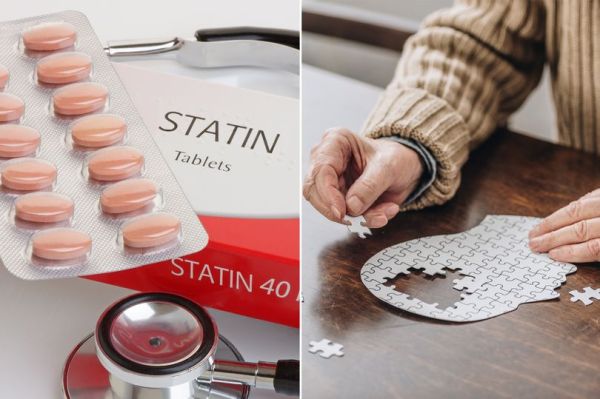
Statins have long been hailed as a "wonder drug" but it appears scientists have found another string to their bow. A study shows people with low levels of "bad" cholesterol are less likely to develop the devastating brain condition.
And, crucially, statins lowered the dementia risk even further in people with low LDL - low-density lipoprotein. Statins are one of the most commonly prescribed drugs in the UK, with around seven to eight million people taking them to cut their chance of heart attack and stroke.
LDL is often called the bad cholesterol because it collects in the walls of blood vessels, raising the risk of potentially deadly health issues such as a heart attack or stroke.
READ MORE:
READ MORE:

Researchers from South Korea examined data on 570,000 people in the country and said their findings "underscore the crucial role of managing LDL-C in lowering dementia risk".
The says that people should aim for bad cholesterol levels in the blood to be below 4mmol/L (millimoles per litre). Participants whose LDL cholesterol levels were below 1.8 mmol/L had a 26% reduced risk of dementia and a 28% reduced risk in Alzheimer's compared to those who have LDL cholesterol levels above 3.4 mmol/L.
Dr Richard Oakley, spokesman for the Alzheimer's Society, said: "This study adds to our understanding by showing the strong connection between heart and brain health. Simply put, what is good for the heart is good for the head."

Among people with LDL cholesterol levels below 1.8 mmol/L, statin use was linked to a 13% reduction in dementia risk and a 12% decrease in risk of Alzheimer's disease compared with non-users.
Author Dr Minwoo Lee, of Hallym University College of Medicine in South Korea, said: "The benefits of low LDL-C levels to protect against cardiovascular events is well recognised, but the relationship between LDL-C levels and dementia has been less clear, particularly the cut-off for LDL-C below which there is no further benefit for reducing risk of cognitive decline."
Reducing LDL-C to "very low" levels below 0.8 mmol/L (<30mg/dL) did not reduce dementia risk further. Most of the cholesterol in the human body is LDL. The rest is high-density lipoprotein (HDL) or "good" cholesterol. HDL takes LDL to the liver, where it's flushed out of the body.
The new study, published in the Journal of Neurology Neurosurgery & Psychiatry, accessed data collected by 11 university on adult outpatients with no previous diagnosis of dementia followed for at least 180 days after LDL-C testing.

The study concluded: "These findings emphasise the importance of targeted LDL- C management as part of dementia prevention strategies, with potential integration into clinical guidelines. The results support the use of statin therapy within specific LDL- C ranges for both cardiovascular and cognitive health benefits. This insightful understanding of how statin use interacts with LDL- C levels emphasises the need for personalised statin prescriptions, focusing on achieving LDL- C levels that offer the maximum cognitive benefits."
Dr Julia Dudley, head of research at Alzheimer's Research UK, said: "This large study looked at patient records for levels of LDL cholesterol and the risk of dementia, it also examined those patients who were on statins. The use of statins seemed to offer a protective effect - even in those who already had cholesterol levels within a lower range. However, dementia risk is complex and influenced by many factors. Without a detailed picture of what's going on in the brain we do not know if there is a direct link between lower cholesterol and reduced dementia risk.
“Clinical trials will be key to understand what effects statins might be having on disease processes in the brain. In the meantime, keeping our hearts healthy remains one of the most effective ways we can protect our brain health. If you have any concerns about your cholesterol levels, you should speak to your GP."
Dr Oakley added: "Dementia risk is complicated and determined by several factors including genetics, lifestyle, and the environment. This is an ever-evolving topic, and more targeted research and trials are needed to understand whether statins can help protect the brain. However, it is crucial to talk to your GP before making any changes to your medication".